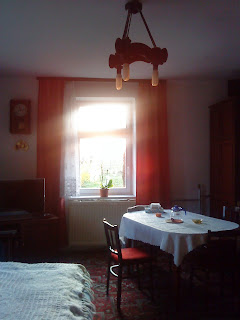To summarise for my English speaking friends, the article talks about an incident that occurred in Lublin in one of the city’s recreational parks. On a busy Saturday evening, in a park with special paths designated for bicycle riders, an incident took place. You see a man blindingly drunk was riding a bicycle and fell over, creating problems for many of the path's users. The man was so drunk that he could not stand up, let alone get back on the bicycle. One of the ladies passing by told him that he shouldn’t be riding under the influence, he responded by saying “Can’t you see I can’t walk!”.
Another passer-by seeing this incident called the police, and was told that the police can’t do anything until there is a serious incident. The police directed the passer-by to a local community watch who once again told the person that he can’t stop moving vehicles, let alone breath test their occupants. Discussion followed about who should take responsibility for managing these types of incidents as they have been occurring quite often in the recreational park. On one hand I found this story quite frivolous and amusing, yet underneath it all this story underlies a very serious issue that affects Polish culture—the issue of excessive alcohol consumption.
Alcohol is present in most of the developed and even developing countries. Since Biblical times people have been consuming alcohol and it’s derivatives, but I don’t think alcohol has caused so much social harm as it is causing today.In Australia we see the social harm that has been caused by alcohol such as violence, risky-youth behaviours, family dysfunctions and more. Yet overall drinking and alcohol is largely glamourized, while at the same time, kept at bay. Australian government has put a lot of effort into ensuring that the sale of alcohol and the social harm is minimised. Government’s efforts such as stringent advertising laws, appropriate age restrictions, relatively high alcohol taxes as well as the well-targeted educational advertising have kept alcohol and it’s harms at manageable level.
In Poland, alcohol and it’s consumption is a totally different story.
Many-a-time foreigners have stereotyped Polish people as drunks, and while for some it may be highly offensive and untrue, this generalisation is largely correct. In my two months here I have seen how alcohol is wreaking havoc in the name of Polish culture. There are many reasons for this, some are the result of economic conditions while others are ingrained in traditions, but overall they all reek with social dysfunction. When I first arrived in Poland, beggars on the street kept asking me for 1zł (40c). I wondered why that was so, until I found out that in Poland beer can be cheaper than water and can be bought at any supermarket or corner store. Sometimes you can even find it among the shelves with other soft-drinks and energy drinks. I was staggered when I learnt this. How can the government allow alcohol to be so cheap, I questioned. I am yet to find out.
Since learning that alcohol is so cheap, whenever someone asks me for 1 złoty for supposed “food” or “medication”, I look at them questioningly. Yet some beggars don’t even hide the fact that they are begging for alcohol, some ask openly hoping that their honesty will be rewarded with a bit of money for their hit. You see, for a lot of people in Poland, alcohol is their daily food. They drink from early in the morning till late at night, barely taking a break to sleep. For some it’s the only thing they do, or the only thing they know how to do.
Sometimes on my way to work I see a familiar beggar that keeps asking me for 1 zł for “medication”, the same beggar also asks me on my way from work. Further along the street I see old men stumbling along the path or sitting by the corner store drinking. There is a lot of broken bottles and glass littered all around that corner store. It must be a meeting spot for the community of drunks. Catching a train or a tram can also be a challenge at times. Sitting on a train minding my own business often I can’t help but be overwhelmed by the stench of alcohol and urine that wafts over from neighbouring seats where an intoxicated individual is barely sitting upright. It’s ok if the trip is short, but try sitting there for half an hour—it’s a tough job trying not to vomit.
But then on the other hand, I feel sorry for these people (I’m one of the very few that does), because their situation is largely the outcome of their surroundings and traditions. Surrounded by alcohol and alcohol advertising from early age, they have become conditioned to view drinking as part of the social norm. All around, advertising on television, in the radio, on billboards all proclaim alcohol to bring happiness, social acceptance and glamorous life. Furthermore the tradition of celebrating every little thing, from bearing a son to finishing work on time, with a “nalewka” (or shot) of hard spirits keeps breeding new generations of people that have grown up with drinking. To break away from these traditions and culture is like cutting an umbilical cord.
In my two months here, seeing what part alcohol plays in society and what it does to people I have started to see it as more and more disgusting. In Australia, I’ve held a bit of a naïve view that alcohol may have its benefits in that it relaxes people and allows them to be “themselves but more fun”. But seeing what alcohol really does has opened my eyes. I don’t think that I will ever see it as glamorous, again. I have seen how it degrades people and how under the mask of “confidence” if offers “fun”, yet brings embarrassment, head-aches and destruction of the soul. 

